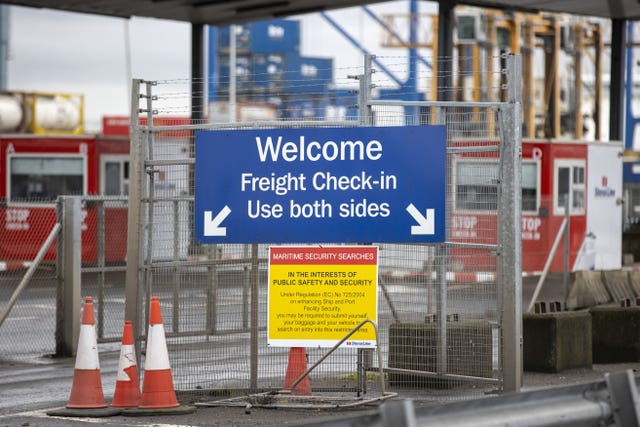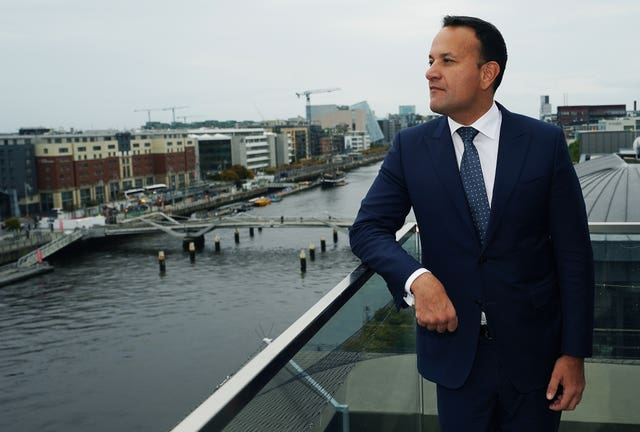The Government is in the “final stages” of engagement with the DUP over its concerns as further changes of the Windsor Framework come into effect on Sunday, including the green/red lane system for the movement of goods, the Northern Ireland Secretary has said.
Chris Heaton-Harris added there is “still more work to do” and called for the restoration of Northern Ireland’s institutions.
The DUP has been blocking powersharing for more than a year in protest at the internal UK trade barriers created by Brexit’s Northern Ireland Protocol.
The party says the deal struck by the EU and the UK to reform the protocol – the Windsor Framework – does not sufficiently address its concerns and has made clear it will not accept a return to devolution until the Government provides further assurances, by way of legislation, over Northern Ireland’s place in the UK internal market.
Talks between the DUP and the Government have been ongoing over the summer.
Prime Minister Rishi Sunak said on Thursday that the agreement of the framework removed the major stumbling block to the return of the Stormont Assembly.

However, DUP MP Sammy Wilson said on Friday that the changes will “confirm” a border in the Irish Sea, adding that his party would not return to the powersharing institutions at Stormont as it would be legally required to implement the framework.
On Thursday, Sinn Fein vice president Michelle O’Neill said patience had run out with the DUP blockade of the Assembly.
She called on the UK and Irish governments to work together on a plan to restore the institutions.
Writing in the News Letter on Saturday, Mr Heaton Harris said the Government had engaged with the DUP “extensively” over the summer and that the party’s proposals had improved the green-lane system.
He added that work is ongoing to address the party’s concerns to restore Northern Ireland’s executive.
“We are also in the final stages of a period of constructive engagement with the DUP. We are pulling together a comprehensive package of proposals that we hope will address their concerns.
“I have no doubt that it is their genuine desire to focus on concrete improvements and to create a situation that will enable the Executive to be restored.
“I firmly believe that restoration of the institutions is right for Northern Ireland and right for the future of the Union.

“To address concerns about divergence between Northern Ireland and Great Britain, we have to not only show that goods trade is working, we also have to show we are tackling worrying disparities on healthcare waiting lists, on childcare, on environmental pollution, on pay for our teachers, nurses and hardworking public servants, and on hundreds of smaller decisions being taken every day.
“To do that we need a devolved government here.
“Over the coming weeks we have a chance to move forward, to move on from Brexit and get Northern Ireland moving again.
“Together we can make this work for everyone in Northern Ireland.”
Speaking to reporters on Saturday, Irish premier Leo Varadkar said his Government “stands ready to help in any way that we can” for the restoration of Northern Ireland’s institutions.

He added: “When it comes to the Windsor Framework though, businesses big and small in Northern Ireland are getting on with it and they’re implementing the framework.
“And we can see there are huge economic economic opportunities for Northern Ireland which has this unique position, as the Prime Minister has pointed out, having access both to the British market and full access to the European Union market as well.
“And we’re seeing a huge amount of increase in trade going north and south. So I think, on the ground, we’re seeing business people and traders getting on with it and implementing the new arrangements and I think that’s a positive thing.”
One of the main parts of the framework, the green/red lane system for the movement of goods, will become operational at Northern Ireland ports on Sunday.
Goods coming into the region which are travelling to the Republic of Ireland or elsewhere in the EU will use the red lane, which includes customs declarations and some checks.
Goods to be sold in Northern Ireland will use the green lane with minimal paperwork and no checks.
Companies that use the green lane will be signed up to a trusted trader scheme.
Writing in the News Letter, Mr Heaton-Harris said the vast majority of Northern Ireland’s economic life remains “umbilically connected to the rest of the UK”, with most of the economy untouched by anything in the Windsor Framework.
He said Northern Ireland already enjoys the same VAT, alcohol duty and energy tax rules as the rest of the UK under the Windsor Framework, which it did not under the Northern Ireland Protocol.
The Northern Ireland Secretary added concerns over the supply of human medicines have been addressed.
Mr Heaton-Harris wrote: “From this Sunday further changes roll out – meaning that previously banned goods like sausages and seed potatoes will be able to move again to Northern Ireland.
“Businesses will see paperwork cut and many more traders will be able to benefit from the Windsor Framework.
“Some major UK food retailers, which were excluded from the old ‘grace periods’, faced burdensome red tape moving food into Northern Ireland under the old system, but can now move products through the green lane.
“The steak bake or infamous sausage roll will never again need to be accompanied by a signed certificate from a vet to move into NI from GB, removing a major irritant with the old arrangements.
“This is the culmination of months of work, after the UK and EU came to an agreement to change the old Northern Ireland Protocol.”
Mr Heaton-Harris noted that consumers may notice some changes in their local shop.
Consumers in Northern Ireland and parts of the UK will see “not for EU” labels and other information in stores on some products, to prevent these from being sold in Ireland.
“To ensure consistency across the UK, these labels on meat and dairy will apply in stores in Great Britain next year.
“And it is consistency across the UK that we are delivering, allowing UK food safety standards to apply in a way that the old Protocol failed to do.
“I know that some people remain concerned about how the Framework will work in practice.
“I have always been clear that the Government will listen to those concerns and there is scope to address them.”
Stuart Anderson, head of public affairs for Northern Ireland Chamber of Commerce and Industry said: “A significant amount of work has been undertaken in a short time to get us to this implementation phase, particularly by those involved in the retail supply chain.
“These are new processes being applied to what are often high volume and complex movements.
“But business has worked hard to ensure we get off to the best possible start.
“This is new for everyone involved.
“Continued engagement and a solutions focused approach with government will be important to help businesses adapt and deal with any issues as and when they arise.”




Comments: Our rules
We want our comments to be a lively and valuable part of our community - a place where readers can debate and engage with the most important local issues. The ability to comment on our stories is a privilege, not a right, however, and that privilege may be withdrawn if it is abused or misused.
Please report any comments that break our rules.
Read the rules hereLast Updated:
Report this comment Cancel